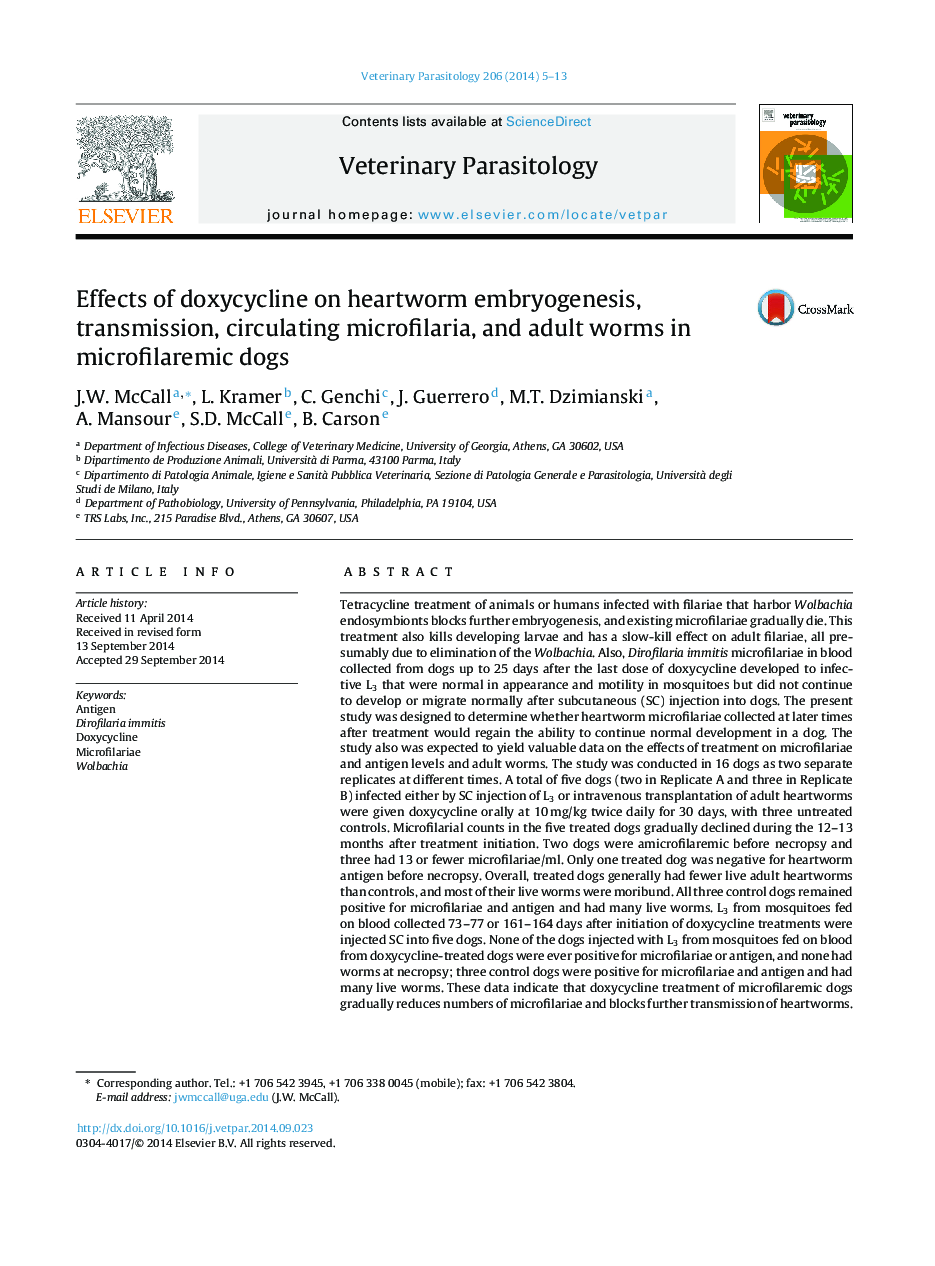| کد مقاله | کد نشریه | سال انتشار | مقاله انگلیسی | نسخه تمام متن |
|---|---|---|---|---|
| 5802659 | 1555679 | 2014 | 9 صفحه PDF | دانلود رایگان |
- A total of five dogs infected either by SC injection of L3 or intravenous transplantation of adult heartworms were given doxycycline orally at 10Â mg/kg twice daily for 30 days, with three untreated controls.
- Microfilarial counts in the five treated dogs gradually declined during the 12-13 months after treatment initiation.
- Treated dogs generally had few adult heartworms, and most of their live worms were moribund.
- None of the dogs injected with L3 from mosquitoes fed on blood from doxycycline-treated dogs were ever positive for microfilariae or antigen, and none had worms at necropsy.
- These data indicate that doxycycline treatment of microfilaremic dogs gradually reduces numbers of microfilariae and blocks further transmission of heartworms.
Tetracycline treatment of animals or humans infected with filariae that harbor Wolbachia endosymbionts blocks further embryogenesis, and existing microfilariae gradually die. This treatment also kills developing larvae and has a slow-kill effect on adult filariae, all presumably due to elimination of the Wolbachia. Also, Dirofilaria immitis microfilariae in blood collected from dogs up to 25 days after the last dose of doxycycline developed to infective L3 that were normal in appearance and motility in mosquitoes but did not continue to develop or migrate normally after subcutaneous (SC) injection into dogs. The present study was designed to determine whether heartworm microfilariae collected at later times after treatment would regain the ability to continue normal development in a dog. The study also was expected to yield valuable data on the effects of treatment on microfilariae and antigen levels and adult worms. The study was conducted in 16 dogs as two separate replicates at different times. A total of five dogs (two in Replicate A and three in Replicate B) infected either by SC injection of L3 or intravenous transplantation of adult heartworms were given doxycycline orally at 10Â mg/kg twice daily for 30 days, with three untreated controls. Microfilarial counts in the five treated dogs gradually declined during the 12-13 months after treatment initiation. Two dogs were amicrofilaremic before necropsy and three had 13 or fewer microfilariae/ml. Only one treated dog was negative for heartworm antigen before necropsy. Overall, treated dogs generally had fewer live adult heartworms than controls, and most of their live worms were moribund. All three control dogs remained positive for microfilariae and antigen and had many live worms. L3 from mosquitoes fed on blood collected 73-77 or 161-164 days after initiation of doxycycline treatments were injected SC into five dogs. None of the dogs injected with L3 from mosquitoes fed on blood from doxycycline-treated dogs were ever positive for microfilariae or antigen, and none had worms at necropsy; three control dogs were positive for microfilariae and antigen and had many live worms. These data indicate that doxycycline treatment of microfilaremic dogs gradually reduces numbers of microfilariae and blocks further transmission of heartworms. This latter effect should be highly effective in reducing the rate of selection of heartworms with genes that confer resistance to macrocyclic lactone preventives and microfilaricides. The data also suggest that doxycycline has a slow-kill effect on adult heartworms.
Journal: Veterinary Parasitology - Volume 206, Issues 1â2, 15 November 2014, Pages 5-13
